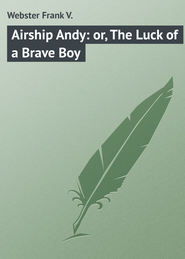По всем вопросам обращайтесь на: info@litportal.ru
(©) 2003-2024.
✖
The Boy Pilot of the Lakes: or, Nat Morton's Perils
Настройки чтения
Размер шрифта
Высота строк
Поля
"I certainly do," he replied, "and it seems to come from this hatch. I sent Nat down there a while ago, to check off some bales."
"I hope he isn't smoking cigarettes down there," said the captain quickly. "If he is, I'll discharge him instantly."
"Nat doesn't smoke," replied Mr. Dunn. "But it's queer why he stays down there so long. I'm going to take a look."
"I'll go with you," decided the captain.
No sooner had they started to descend the hatchway than they both were made aware that the smell of smoke came from the hold, and that it was growing stronger.
"Fire! There's a fire in the cargo!" exclaimed Captain Marshall. "Sound the alarm, Mr. Dunn, while I go below and make an investigation. If it's been caused by that boy – "
He did not finish, but hurried down into the hold, while Mr. Dunn sounded the alarm that called the crew to fire quarters.
Meanwhile, Nat had been lying unconscious under the bale for about ten minutes. The flame from the lantern, which, fortunately, had not exploded, was eating away at the side of the bale which was on top of him. Luckily the stuff in the bale was slow burning, and it smoldered a long time before breaking into a flame, in spite of the fact that the lantern was right against it. Considerable smoke was caused, however, though most of it was carried forward. Still, enough came up the hatchway to alarm the captain and purser.
It would have been very dark in the hold, but for the fact that now a tiny fire had burst out from the bale. By the gleam of this Captain Marshall saw what had happened. A bale had toppled from its place and smashed the lantern. But as yet he had no intimation that Nat was prostrate under the bale.
Meanwhile the smoke was growing thicker, and it was getting into Nat's nostrils. He was breathing lightly in his unconscious state, but the smoke made it harder to get his breath, and nature, working automatically, did the very best thing under the circumstances. Nat sneezed and coughed so violently, in an unconscious effort to get air, that his senses came back.
He could move only slightly, pinned down as he was, but he could smell the smoke, and he could see the flicker of fire.
"Help! Help!" he cried. "Fire in the hold! Help! Help!"
That was the first knowledge Captain Marshall had of the whereabouts of the boy. It startled him.
"Where are you, Nat?" he cried.
"Under this bale! I'm held down, and the fire is coming closer to me!"
Captain Marshall did not stop to ask any more questions. He sprang down beside the bale, and, exerting all his strength, for he was a powerful man, he lifted it sufficiently so that Nat could crawl out. The boy had only been stunned by a blow on the head.
But, during this time, Mr. Dunn had not been idle. With the first sounding of the fire alarm, every member of the crew sprang to his appointed station, and, down in the engine-room, the engineers set in operation the powerful pumps, while other men unreeled the lines of hose, running them toward the hold, as directed by the purser.
So, in less than a minute from the time of sounding the alarm, there was a stream of water being directed into the lower part of the ship where the fire was.
"Come on out of here!" cried the captain to Nat, as he helped the boy up, and let the bale fall back into place. "This is getting pretty warm. I wonder what's the matter with the water?"
Hardly had he spoken than a stream came spurting into the hold, drenching them both. It also drenched the fire, and, in a few minutes, the last vestige of the blaze was out.
"Good work, men!" complimented Captain Marshall, when he had assured himself there was no more danger. "You did well. I'm proud of you."
Nat, who had been taken in charge by the purser, when it was found there was no danger of the fire spreading, was examined by that official. Nothing was found the matter with him, beyond a sore spot on his head where the bale had hit him.
"How in the world did it happen?" asked Mr. Dunn, as the crew began reeling up the hose, and returning to their various duties. Nat told him about hearing the noise, and the bale falling.
"Do you think it fell, or did some one shove it?" asked the purser.
"I don't know. It seemed as if some one pushed it, but who could it be? What object would any one have in trying to hurt me?"
"I don't know, I'm sure. You must report this to Captain Marshall," said the purser. "He'll want to know all about it."
There was no need of going to the captain's cabin, however, for he came to find Nat, as soon as the excitement caused by the fire had subsided.
"Now tell me all about it," he said. "Every bit. Were you smoking down there?"
"No, sir," replied Nat indignantly.
He related all that had taken place, and the captain had every member of the crew questioned, as to whether or not they had been in the hold at the time. They all denied it.
"Maybe it was because the bale wasn't stowed away level," suggested Mr. Bumstead, with a queer look at Nat, as our hero, together with the purser and the pilot were in Captain Marshall's cabin, discussing the occurrence.
"That's possible," admitted Mr. Dunn. "But what made the noise?"
"Rats, probably," replied the mate. "There are some whoppers down in that hold."
"Would you say they were large enough to topple over that bale?" asked the pilot suddenly.
"No – no – I don't know as I would," answered the mate. "Of course not. More likely the lurch of the vessel did it."
"Well, it was lucky it was no worse," spoke the captain. "If that lantern had exploded, and the blazing oil had been scattered about, there would have been a different ending to this. Nat would probably be dead, and the ship a wreck. After this no lanterns are to be carried into the hold. Have some electric lights rigged up on long wires, so they can be taken in," he added to the mate, who promised to see that it was done.
"Hum," remarked Mr. Weatherby, as he and Nat walked toward the pilot-house. "You can't make me believe a lurch of the ship loosened that bale so it fell. Bumstead doesn't stow his cargo in such a careless fashion. He's too good a sailor."
"What do you think then?" asked Nat.
"I think some one pushed that bale down."
"Do you think the person wanted to hurt me?"
"I can't say as to that. It may have been done by accident, by a sailor asleep in the hold. Certainly no rat did it," and the pilot smiled. But he was more worried than he would admit to Nat.
"I am glad I got out."
"I don't suppose you feel much like taking a lesson in navigation?"
"Oh, I'm always ready for that," was the answer. "I'm all right now. My head has stopped aching."
"Then come into the pilot-house with me, and I will explain a few more things to you. I think you have a natural talent for this sort of life, and I like to show to boys, who appreciate it, the different things there are to learn. For there are a good many of them, and it's going to take you a long time."
Nat had no false notions about learning to be a pilot. He knew it would take him several years to be a capable one, but he determined to get a good ground work or the higher branches of it, and so he listened carefully to all that Mr. Weatherby told him.
He learned how to read the compass and how to give the proper signals to the engineer.
For a number of days he spent several hours out of the twenty-four in the pilot-house with Mr. Weatherby. He got an understanding of the charts of the lake, of the various signals used by other ships, to indicate the course they were on, and he learned to know the meaning of the shore signal lights, and the location of the lighthouses that marked the dangerous rocks and shoals.
"You're doing very well," Mr. Weatherby said to him one day. "Much better than I expected. Some time I'll let you try your hand at steering a bit."
"Oh, that will be fine!" exclaimed Nat, but he little knew what was going to result from it.










